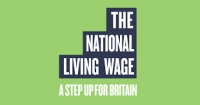
Employers have responded to the National Living Wage (NLW) by raising prices or reducing profits rather than cutting jobs, but more will have to look at productivity-enhancing measures in the coming years, according to a new report published today (Monday) by the Resolution Foundation.
The report, which includes the first major survey of business responses to the NLW since the policy’s introduction on 1 April, considers both the initial impact of the NLW and its longer term prospects in the wake of the UK’s decision to leave the European Union.
The survey of 500 businesses, carried out by Ipsos MORI in the weeks running up to the referendum, finds that around a third (35%) of businesses say the NLW has increased their wage bill this year, though only 6% said it had to a large extent. A further 16% of firms expect the NLW to increase their wage bill at some point in the future.
Of those firms affected by the NLW, the most popular short-term action taken has been to increase prices (36%), followed by taking lower profits (29%). The Foundation notes that while this ‘suck it and see’ approach is understandable in the short-term, many firms will need to adjust their action in the medium-to-long term.
It notes that around one in seven firms say they have already invested more in training (15%), and that one in eight (12%) firms report having invested more in technology. The Foundation says that making these productivity-enhancing approaches a mainstream response to the NLW will help to maintain the success of the policy in the coming years, and help tackle the UK’s wider productivity problems.
The survey finds little evidence of more negative responses to the NLW from employees. Roughly one in seven firms (14%) whose wage bill has increased say they have used fewer workers, offered fewer hours to staff or slowed recruitment. Just one in twelve (8%) say they have reduced aspects of the reward package, such as paid breaks, overtime or Bank Holiday pay. Encouragingly, a lower proportion of all firms plan to take these approaches over the next five years.
Crucially the Foundation adds that there is little evidence in official ONS data that the NLW has had any significant employment effect among lower paid workers. While employment has plateaued since the end of last year the Foundation argues that this has much more to do with pre-referendum business uncertainty and the general tightening of the labour market.
The Brexit outcome is likely to have a major impact on the labour market in the coming months and years. The Foundation notes that sectors such as food manufacturing and domestic services, which rely heavily on EU migrant labour and have a high proportion of staff affected by the NLW, are likely to face major changes in how they recruit and pay staff, and operate their business.
The report also says that the decision to leave the EU has significantly increased uncertainty about the outlook for earnings in coming years. This will have major knock on effects for the NLW because it is set as a proportion of typical worker earnings. Resolution Foundation analysis, using a variety of earnings forecasts, shows that weaker wage growth in the wake of Brexit could reduce the current projected value of the NLW in 2020.
Although there is huge uncertainty regarding the short-to-medium term effect on wage growth, with some projections more encouraging than others, the NLW could fall to between £8.70 and £8.50 by 2020. This is around 40p an hour lower than the £9 figure cited by the Chancellor when he announced the policy last Summer, and lower than the OBR forecast from March of £9.
The Foundation concludes that the case for the NLW remains strong. Increased post-Brexit uncertainty highlights the wisdom of it being pegged to typical wage growth, and reinforces the key role of the Low Pay Commission in taking a flexible approach in the coming years rather than being wedded to a particular cash figure.
Conor D’Arcy, Policy Analyst at the Resolution Foundation, said:
“The National Living Wage has already delivered a welcome pay boost to millions of workers. The big question has been how employers would respond. The evidence so far is that firms have absorbed some of the impact on their wage bill, while passing on a share of those rising costs to consumers through higher prices.
“Encouragingly, evidence of workers seeing their hours cut or even losing their jobs has so far been relatively limited. The challenge now is for firms to continue to respond positively to the National Living Wage, particularly by raising productivity.
“Brexit is likely to reshape the landscape in which many low-paying sectors operate. This means that the expertise of the independent Low Pay Commission is more important than ever, and ministers should carefully heed their advice.
“The National Living Wage is the right policy, and crucially pegs what those at the bottom are paid to what the typical worker earns, rather than to a fixed cash figure. This is a sensible approach, building in necessary flexibility in an uncertain post-Brexit world.”
Leave a comment
Make sure you enter all the required information, indicated by an asterisk (*). HTML code is not allowed.
Join
FREE
Here










